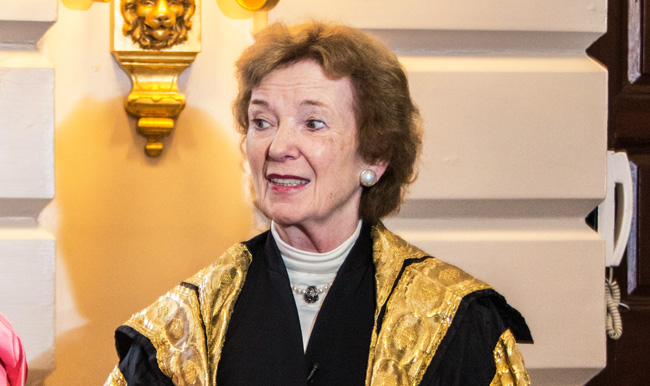It’s not every day that the author of a multi-award winning book is a guest at your university’s book club, come to share insights on the themes of their work. Even more surprising is when said author is a university elected Senator, the first female president of Ireland and a former United Nations High Commissioner for Human Rights. Mary Robinson attended Trinity Vincent De Paul’s (VDP) “Social Justice Book Club” via Zoom yesterday, where she proved to a very engaged audience that her accomplishments don’t need to speak for her.
The book in question, Climate Justice, is an urgent call to arms which informs readers on the economic, gender-based and racial injustices of the climate crisis through documenting 11 diverse stories, and ultimately pointing towards a path of environmental and global healing.
“I don’t accept many invitations, believe me, of the large number that I receive. But, I actually wanted to honour your work”, Robinson told the group. Ciara Fagan and Niamh Carey hosted the evening, which was the book club’s final meeting of the academic year. The event, joined by 42 attendees, held a wonderful intimacy. The ambience was that of a group of friends who had gotten together to discuss environmentalism and climate justice, with one friend simply happening to be a prominent world leader in the area.
Against the backdrop of her stacked bookshelf, Robinson told the group that she can identify “at least” five levels of the climate crisis that require a climate justice focused solution. The first is perhaps the core concept of the book – that the climate crisis “disproportionately and much earlier affects those poorest countries, poorest communities, indigenous peoples”, the small island states and non-white people in the world.
This is due to these communities’ reliance on nature-based economic activities, whether that be crop farming in temperate areas now experiencing dangerously unpredictable droughts, ever-increasing issues with water supply and water cleanliness or an increasing likelihood of fires and natural disasters.
Another area Robinson sought to highlight was the gender injustice of the climate crisis. Of the 11 stories in Climate Justice, nine are from women, Robinson reminded attendees. While it is empowering to amplify the voices of these women, the hardship each of them bears can be uncomfortable to consider. This consideration is vital, however, as Robinson went on to refer to the third “level” of the climate crisis requiring a social justice solution being the role of young people as educators on this topic, while the last two “levels” concern fossil fuels and government inaction. “It will require much more ambition than we are seeing right now in order to bend the curve”, Robinson said.
On the topic of how best to engage with the climate crisis both professionally and socially, Robinson advised looking at the pre-existing injustices: “It’s the richer, more powerful people who are doing most of the polluting, with the impact of it falling on those who suffer the most already”. In regard to the latter of these statements, Robinson suggested a three-step approach towards tackling it.
Firstly, personalise the issue with waste, diet and emission monitoring. Next, “get angry about those who have far more responsibility and aren’t taking it” – governments, companies and large institutions like Trinity. Thirdly, and “probably the most important thing”, according to Robinson, we have to realise the world of climate justice and sustainability before it becomes merely a fantasy.
Despite the climate crisis being an issue rooted in science, it has become politicised in certain jurisdictions, including high-polluting and influential countries like the United States. Carey put this to the book club’s guest, looking for some guidance. Robinson agreed that “it is a great pity”, but has hope that incoming administrations like Biden’s will be able to shift the narrative and call out false lobbying and greenwashing by harmful stakeholders, such as those in the tobacco and oil industries.
Before Robinson left the call, Fagan and Carey asked the author about student activism. Attending and reading about events like this are one thing, but sometimes practical steps are lacking. Robinson responded by emphasising the need to promote public opinion in critical mass in order to engage with the climate crisis. We need to use our voice, and amplify that voice by joining with others and fostering good leadership. On this note, Robinson shared one of her favourite quotes with us: “You are never too young to lead. You are never too old to learn.”
Conversing about the topic of environmentalism can oftentimes leave people with a bad taste in their mouth, whether of guilt, anxiety or a concoction of the two. However, the fervour of those present at the event and the knowledge shared within VDP’s community resulted in the exact opposite – a sentiment of hope and the possibility of change.







